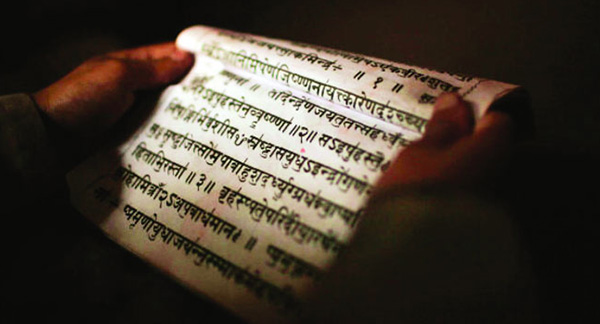Sanskrit - Deva-Vani | The Indo-Aryan language
One of the oldest Indo-European languages for which substantial documentation exists, Sanskrit is believed to have been the general language of the greater Indian Subcontinent in ancient times. It is still used today in Hindu religious rituals, Buddhist hymns and chants, and Jain texts.
The origin of the language in written form is traced back to the 2nd millennium BCE when the Rig Veda, a collection of sacred hymns, is assumed to have been written after being continued for centuries through oral tradition and preservation of verbal knowledge in the Guru-Disciple relationship. The purity of this version (Vedic period, 1500 – 500 BCE) of Sanskrit is doubtlessly reflected in the flamboyance of the perfect description of the forces of nature in the Rig Veda.
The term 'Sanskrit' is derived from the conjoining of the prefix 'Sam' meaning 'samyak' which indicates 'entirely', and 'krit' that indicates 'done'. The language is believed to have been generated by observing the natural progression of sounds created in the human mouth, thus considering sound as an important element of language formation. This is one of the prime reasons why Sanskrit has been rich in poetry and its expressive quality of bringing out the best meaning through perfect sounds that are soothing to the human ear.
Around 500 BCE, the ancient scholar Panini standardized the grammar of Vedic Sanskrit, including 3,959 rules of syntax, semantics, and morphology (the study of words and how they are formed and relate to each other). Panini’s Astadhyayi is the most important of the surviving texts of Vyakarana, the linguistic analysis of Sanskrit, consisting of eight chapters laying out his rules and their sources. Through this standardization, Panini helped create what is now known as Classical Sanskrit.
- Sanskrit - Originated Early as 1700-1200 BCE.
- Orally Preserved as a Part of the Vedic Chanting Tradition.
- Panini’s Classical Sanskrit defined the Grammar, Around 500 BCE.
SANSKRIT AS A TECHNICAL LANGUAGE
Students apply basic knowledge of Sanskrit for practical application at this professional level. They review common terms, practice their pronunciation. Through repetition and example, students gain familiarity with common terms to prepare them for further study.
Learn Traditional Indian Medicine Online
With clinical internship opportunities at Kerala.
Satvajnana Online Academy will provide recognised certificate on completion of the course along with internship.
Other Courses
This course starts with a short intro to the Sanskrit language with its origin, evolution and its uniqueness.
This course commences with an introduction to the tantric philosophy and tradition- its origin, evolution and its spread is discussed.





